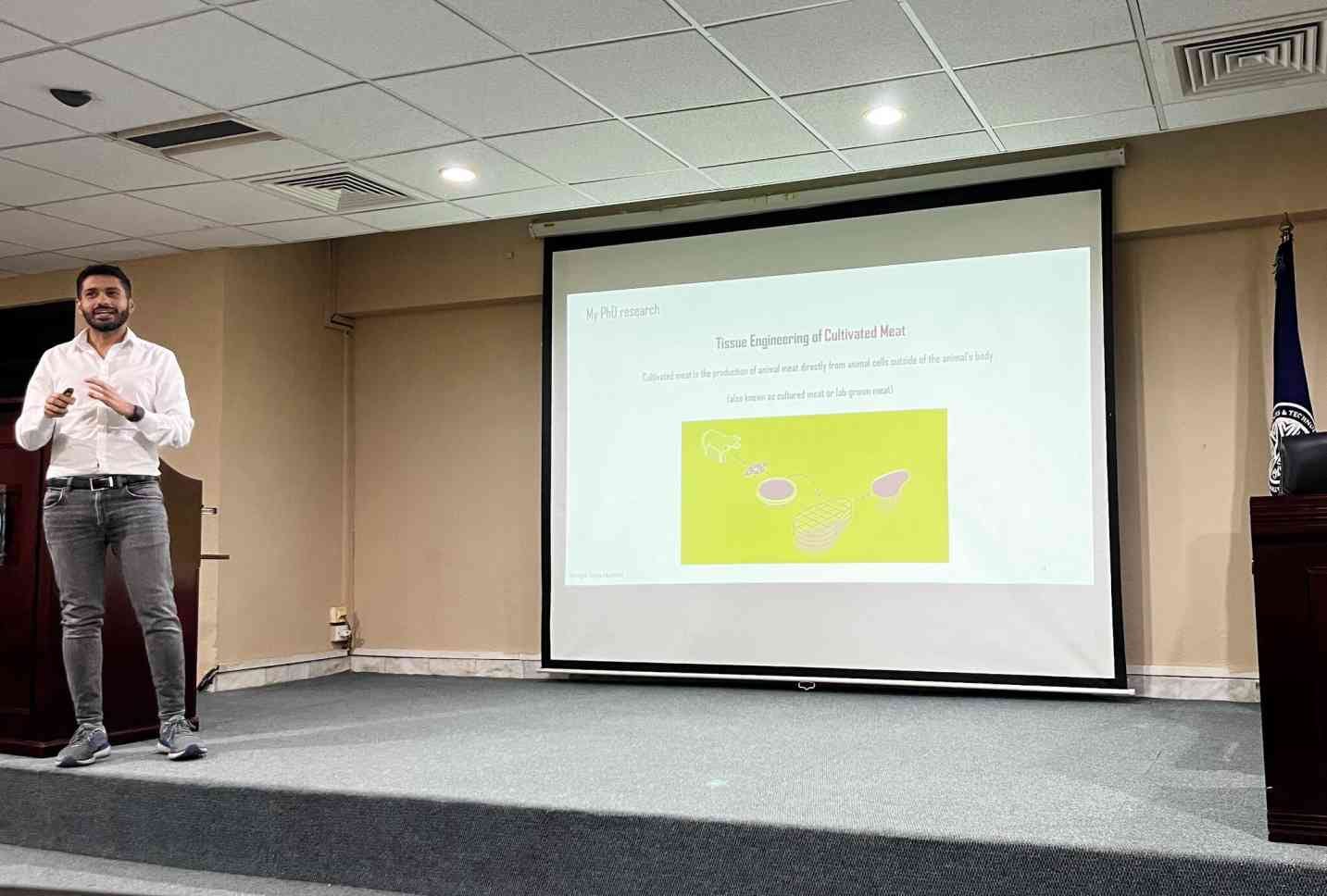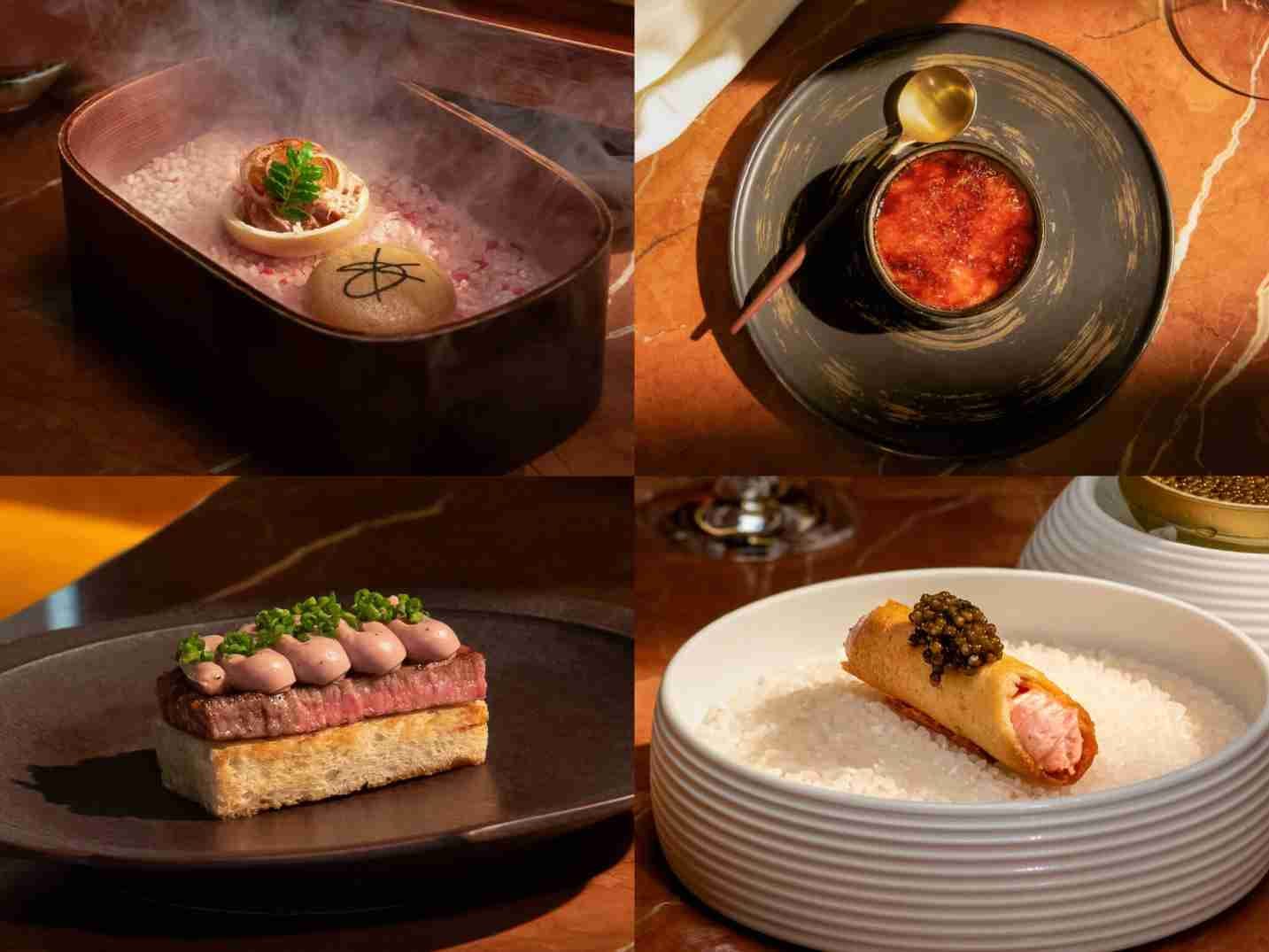Cultivated Quail Approval, $40M for Animal-Free Egg Protein, and Biotech-Based Iron Deficiency Solution
Also: Pakistan's first-ever cultivated meat presentation (probably)
Hi, welcome to issue #59 of the weekly newsletter. Thanks for being here!
Here’s my favourite quote that I came across this week:
"La Vie [...] was the recipient of a cease-and-desist letter by the pork lobby, which accused it of unfair competition, stating that its plant-based bacon lardons were too similar to their conventional counterparts."
- Green Queen’s Anay Mridul
Let’s dig into the latest developments in biotech-enabled food innovation! 🍽
BIO BUZZ
🇦🇺🇸🇬 Vow received regulatory approval in Singapore for its cultivated quail
This makes the Australian startup just the fourth company globally and second in Singapore to get approval for cultivated meat products. The product, called Forged Parfait, debuts at the Mandala Club under the Forged brand.
Introducing Quailia, a new concept animal inspired by quail, Vow aims to create unique dining experiences beyond replicating existing meats. This strategy is the “first” of its kind globally, focusing on originality in cultivated meat.
Vow is producing and commercializing cultivated meat at a fraction of the capital used by leading competitors such as Eat Just ($850M), Upside Foods ($608M), and Aleph Farms ($115M). The company has achieved commercial status in half the time compared to some of its competitors.
Source: Green Queen
🥔 Finally Foods is producing dairy proteins using genetically engineered potatoes
Emerging from stealth, the molecular farming startup uses AI-powered technology provided by Evogene, which it says will speed up the process of developing plants expressing high levels of casein proteins.
The Israeli startup aims to secure regulatory approvals in the US market as part of its long-term strategy, navigating a potentially challenging regulatory pathway compared to precision fermentation.
Unlike microbial expression systems that produce individual casein proteins separately, Finally Foods aims to grow all four main casein proteins (alpha 1, alpha 2, beta, and kappa) in a single genetically engineered potato.
Source: AgFunder
🥢 Chengdu Bowl introduced two Solein-based dishes from Sichuan cuisine to add “protein from thin air” to menus
Solein is a microbial protein produced by Finnish startup Solar Foods from electricity and carbon dioxide, effectively crafting it "out of thin air." The ingredient received its first novel food regulatory approval in Singapore in September 2022.
Chengdu Bowl, a Singaporean restaurant known for its Chinese cuisine, introduced Solein-powered vegan versions of Mapo Tofu and Sour and Spicy Soup. It aims to maintain the authentic flavours of Sichuan cuisine while incorporating “an ingredient designed for the future in the mix.”
Solar Foods' air-based protein has previously appeared on innovative menus by chefs in Singapore. Last year, the company collaborated with The Lo & Behold Group, a hospitality firm, for a tasting event.
Source: Food Ingredients First
🐟 Avant Meats plans to expand its cultivated seafood manufacturing capacity to 2000 L bioreactors in Singapore
Already running the first pilot-scale batches in 50 and 250 L, the startup, with operations in Singapore and Hong Kong, currently produces several kilograms of cultivated fish per batch.
According to CEO Carrie Chan, the products have received positive consumer feedback from a tasting event featuring Chinese-style dishes made with cultivated fish.
Having raised $10.8 million Series A funding in mid 2022, the company plans to raise “tens of million of US dollars” later this year to support its expansion plans.
Source: South China Morning Post
🐔 SuperMeat's LCA reveals a 47% emissions reduction in its cultivated chicken versus conventional chicken when using renewable energy
Even using the standard US electricity grid and an unoptimized supply chain, SuperMeat's production still achieves a 27% decrease in carbon emissions compared to the most favourable estimates for traditional chicken.
SuperMeat's chicken production mainly impacts the environment through the culture medium (72%), followed by energy usage (8%) and other consumables (20%). The Israeli startup claims that its efficient bioprocessing and reuse of spent cell culture media contribute to the lowest carbon footprint documented.
The analysis also shows a 90% reduction in land use compared to traditional chicken farming. Other measures show a 64% reduction in fine particulate matter (PM) formation compared to the 2030 benchmark for conventional chicken emissions.
Source: vegconomist
🧫 Ayana Bio's plant cell culture could offer a solution to the supply issues and volatile pricing faced by high-quality botanical sourcing
Challenges like threats from bad weather, political instability, adulteration, pesticides, heavy metals, and disease can lead to supply issues and volatile pricing of high-quality botanicals.
Ayana Bio’s method involves using plant cell culture to produce bioactives found in botanicals, offering a consistent supply without traditional agricultural headaches. This process involves de-differentiating plant cells to a stem-cell-like state for proliferation and eliciting specific compound production.
When extracting bioactives from fully grown plants is too expensive, impractical, or unreliable, plant cell culture offers a solution. This method can produce a full set of bioactives (not just single chemicals) and potentially increase bioactive production 10-20x more than traditional cultivation.
Source: AgFunder
MACRO STUFF
🌏 Asia's embrace of cultivated meat will bring industry leadership
APAC countries are rapidly advancing in the cultivated meat sector, with regulatory frameworks being updated and approvals for sale being granted. This contrasts with the cautious or restrictive approaches seen in the EU and the US.
The APAC region's embrace of cultivated meat and its strategic investments in food tech signal a potential shift in global economic leadership in innovative food production. This mirrors historical shifts seen with solar panels and lithium-ion batteries, where Asian countries emerged as pioneers.
High-profile endorsements from national leaders and successful introductions of cultivated meat products at international events show the APAC's commitment to and optimism about the future of sustainable food supply.
Source: Nikkei Asia
🍽️ Why food tech companies should pursue food regulatory approval in multiple jurisdictions at the same time
It speeds up market entry, optimising costs by reducing duplication in product testing, documentation, and administrative procedures. This approach minimises delays, allowing companies to capitalise on market opportunities swiftly.
Doing so helps identify and address potential hurdles earlier, mitigating risks effectively. And it provides companies with the flexibility to expand into new markets quickly.
Gaining regulatory approval in multiple jurisdictions improves brand credibility and instills consumer confidence. It differentiates companies from competitors and positions them as reliable partners in the global market.
Source: vegconomist
👨🏽🌾👩🏻🌾 Opportunities for farmers in alternative proteins
Farmers have opportunities to engage with the alt proteins market by supplying ingredients for plant-based foods and fermented or cultivated meat products, which are growing in consumer interest and market share.
Existing farm infrastructure can be adapted for the production of fermented proteins, allowing farmers to diversify their production lines with minimal adjustments.
Collaborations with food and tech companies offer farmers a path to maximising outputs through long-term partnerships and co-investing in technologies to mitigate transition risks.
Source: ProVeg International
JOIN HACKSUMMIT
The HackSummit, Europe’s largest gathering of ClimateTech builders and investors returns to Lausanne Switzerland on June 13-14th for two days of networking and deal-making.
👀 See the full lineup of speakers here.
Use the code BetterBioeconomy20 to save 20% on your pass!
BIO BUCKS
🍳 Onego Bio raised $40M in Series A funding to commercialise its animal-free egg protein
The Finnish precision fermentation startup creates Bioalbumen, a bioidentical version of the major egg white protein ovalbumin. Onego also expects to receive self-affirmed GRAS status in the US soon to enter the North American market.
Bioalbumen is a nutritionally complete protein containing all essential amino acids. It also has the highest possible protein digestibility score, with over 90g of protein per 100g of egg white.
The patented technology allows the production of 120g of protein per litre in 250,000-litre fermentation tanks, achieving near price parity with conventional egg proteins.
Source: Green Queen
🩸 Ironic Biotech raised €1M pre-seed funding for precision fermentation-based plant-derived proteins to address iron deficiency
Up to 25% of the global population suffers from iron deficiency, which causes severe symptoms and goes widely undetected. Ironic Biotech aims to help 2 billion people prevent and recover from iron deficiency and anaemia, noting a performance gap largely affecting women due to natural iron loss.
The Lund-based biotech startup plans to use the funding for further R&D, expand its patent portfolio, and optimise the production process. It's currently looking for partners in the food and food supplement industries.
Ironic Biotech's patented compounds offer a solution to the downsides of current iron supplements and meat-based sources, with no side effects, room temperature storage, and high absorption rates.
Source: EU-Startups
🛠 Liberation Labs secured $12.5M in funding to advance its precision fermentation facility
The funds will be used to support the construction of Liberation Labs' facility in Indiana, as the company heads towards their Series A round.
The investment was made through a Secured Convertible Promissory Note (SCPN) using Agronomics’ existing cash reserves, with a notable contribution of $10 million to this round.
Liberation Labs tackles the fermentation capacity gap in cellular agriculture and is halfway through building its first facility. This site is expected to have a 600k L fermentation capacity, with potential expansion to 4 million litres.
Source: Cell Base
📉 European food tech startups saw investment decrease 35% in 2023 from 2022
This is a 56% drop from 2021. However, Europe’s share of global food tech investments increased to 32% from 14% in 2020.
The overall decline in investments is attributed mainly to a reduction in large deals, though the number of deals, especially in early stages, has increased.
On a positive note, there was an uptick in investments in ag tech and food science (alternative proteins and new brands) sectors.
Source: DigitalFoodLab
SOCIAL FEAST
🇵🇰 First-ever cultivated meat presentation in Pakistan (probably)

Source: Irfan Tahir
🛡 Fungal yeasts could be a promising option for crop protection and food preservation
Antagonistic yeasts can inhibit the growth of pathogenic fungi, bacteria, and other microbes, making them useful in biocontrol strategies for crop protection and food preservation.
They offer a sustainable alternative to chemical fungicides, with the potential to reduce fungal infections in crops by 50-70% and increase the shelf life of perishable foods by up to 30%.
Using yeast-based biocontrol strategies could save up to $30 billion annually in post-harvest losses worldwide and prevent up to 5,000 mycotoxin-related illnesses each year. Also, these methods are about 20% cheaper to cultivate than traditional fungicides.
Source: Maya Benami
MORE ON BETTER BIOECONOMY
🌏 APAC's March 2024: 10 noteworthy food biotech advancements
Singapore’s Umami Bioworks and Shiok Meats announced a merger to become a global leader in cultivated seafood.
India is progressing in establishing a regulatory framework for cultivated meat and seafood, with FSSAI formulating safety regulations.
Australia's Cauldron raised AUD 9.5M in Series A funding to scale up its precision fermentation platform.
Check out the full March 2024 roundup
💬 Bio Talks: Conversations with bioeconomy innovators
Synonym's co-founder, Joshua Lachter: Financing and Developing Infrastructure for the Bioeconomy
Bioshyft's founder, Gerrit Feuerriegel: Connecting Innovators, Investors, and Incumbents to Drive the Bioeconomy
Terra Bioindustries’s CMO, Rebecca Palmer: Turning Agrifood Byproducts Into Nutrient-Rich B2B Ingredients
That’s a wrap. Thank you for taking the time to read this issue!
Are you new here?
Know anyone else who would dig this newsletter?









